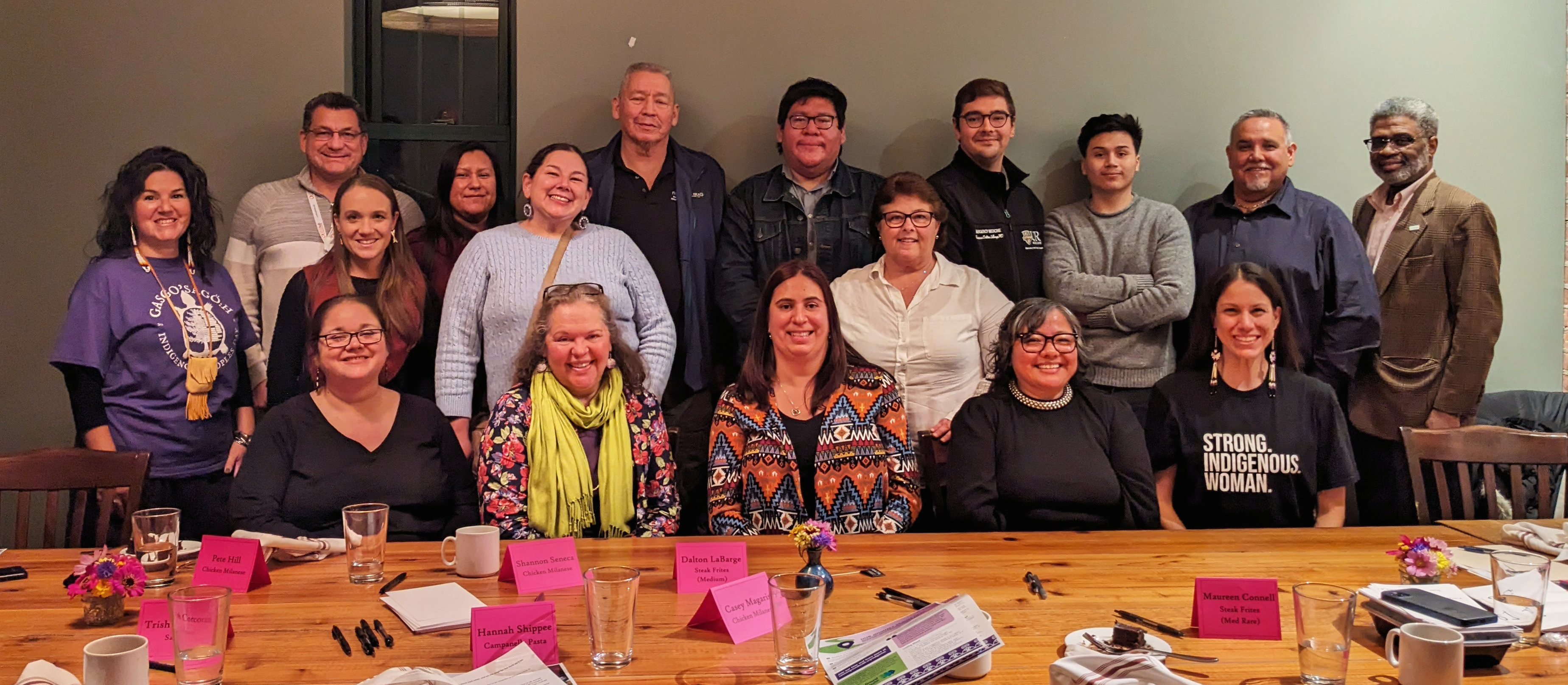

Honoring Ancestral Heritage, Championing Health, Igniting Change, United We Thrive
The Indigenous Health Coalition held its first meeting in November 2023. Led by a small group of local Indigenous advocates, our coalition focuses on improving health and wellbeing within Native communities. Presently, we are in the pivotal strategic planning stage to shape our plans to address our goals. You can learn more about our work by signing up to receive coalition updates below.
Stay up to date on our coalition
Have questions? Please contact
Hannah Shippee: 585-224-3152; or email hannah.shippee (at) commongroundhealth.org
Mission
The Indigenous Health Coalition honors the wisdom and knowledge of our Indigenous elders and our traditional healing legacies. We bravely cultivate and nurture a compassionate movement that sows seeds of health and well-being, while reaping fields of strength that ignite high quality holistic wellness opportunities for all Indigenous voices. We are transforming lives for the next seven generations and beyond.
Vision
Thankfulness, Health, and Wellbeing
We envision a world in which sgë:nö’ thrives within all Indigenous people.
Our Roster
- Angelina Hilton
- Enrolled member of the Sac and Fox Nation of Missouri in Kansas and Nebraska
- Founder of Native Made
- Casey Magaris
- Mohawk from Akwesasne
- Rohsennase Dalton LaBarge, MD
- Ahkwesahsne Kanienkehaka Wahkskarewake
- URMC Emergency Medicine
- Dean Seneca
- Seneca
- Seneca Scientific Solutions +
- Hannah Shippee
- Common Ground Health
- Kelly Keemer
- Seneca
- Nasakoskaka Kendall R. Scott, Jr.
- Kickapoo Tribe of Oklahoma, and Meskwaki Nation, the Sac and Fox of the Mississippi in Iowa
- Director, Native American Future Stewards Program, Division of Diversity and Inclusion, Rochester Institute of Technology
- Kristina LoBello, MS, RN
- Tonawanda Seneca
- Maureen Connell, MBA, LMFT
- Indigenous Mexican
- Pete Hill
- Cayuga, Heron Clan
- Special Initiatives Director at Native American Community Services of Erie & Niagara Counties, Inc.
- Ronalyn (Ronnie) Pollack
- Mississaugas of the Credit First Nation/Six Nations of the Grand River
- Adjunct, Health & Physical Education Department - Monroe Community College
- Todd Michel Waite
- Seneca
- Trish Corcoran
- Tonawanda Onondowaga
- The Harley School, Indigenous Peoples Day Committee
- Whitney Brooks, MS, RDN
- Seneca Nation
- Owner of Full Circle Nutrition
- Jennie Brant
- Tyendinaga Mohawk
- Farmer/Owner at Enka:ri Farm
- Carl Hatch-Feir
- Enrolled Member of the Mohawks of the Bay of Quinte (Tyendinaga)
- Vice Chair, Friends of Ganondagan
- Madison Tighe
- Seneca Nation/Turtle Clan
- Indigenous Health and Wellbeing Promotion Program Coordinator, Native American Community Services
What Led to the Launch of Indigenous Health Coalition?
The Listening Tour
In the spring of 2021, Common Ground Health worked to educate and engage residents of the Finger Lakes region on the COVID-19 pandemic. As part of this effort, we noticed the Indigenous population was significantly overlooked. Not knowing where to go, or having an established relationship, we reached out to several local Indigenous advocates to collaborate. Together, we have begun to build a partnership to extinguish the invisibility of the Indigenous community in health planning and identify ways we can address and support Indigenous health equity. While our group is small and does not represent all Indigenous voices, our goal is to be inclusive of any Indigenous people who want to be involved. Our group conducted focus interviews with Indigenous people to obtain their views on the most pressing health issues in their community. Below you will find a summary of what we’ve observed, and our recommendations from what we’ve heard so far. We recognize there will always be more to learn and will continue to seek input to ensure this is a grounded community-led effort.
Who have we heard from so far?
- 21 interviews conducted from spring to fall 2022
- Those interviewed have backgrounds in medicine, dentistry, mental health, women’s health, art therapy, counseling, health research, Indigenous language, Indigenous ceremonies, Traditional medicine, climate change, food/nutrition, Indigenous advocacy, public relations, community service, higher education, and social work.
- All have lived experience on and off territory, navigating through today’s Indigenous ways of life.
“People are still using Traditional medicines. Engaging in these practices results in mental, physical, and spiritual benefits. It is essential to incorporate this and not only focus on western medicine.”
What Are We Learning?
Top priority health issues identified:
- 100% of interviewees named mental health as a top priority, driven by the impacts of intergenerational trauma and Adverse Childhood Experiences (ACES)
- 67% named chronic diseases as a top priority (diabetes, cancer, obesity)
- 53% named addiction/substance abuse as a top priority issue in part due to a lack of mental/behavioral health services
Top barriers identified to addressing Indigenous health inequities in our region:
- Lack of collaboration across Indigenous communities to address the health needs of both those living on and off territory
- Lack of access to quality health care
- Lack of access to culturally competent health care
- Lack of data and invisibility
Assets that already exist to support Indigenous health equity:
- Our Traditional ways of life, knowledge, teachings, diets and medicines
- Established Native programs and initiatives in our region
“[There is] stigma around mental health: We don’t want to talk about it. In our own communities we’ve been conditioned to not recognize that what we’re experiencing are mental health issues. We don’t always have access to our own cultural practices that would help these issues and don’t have access to medical services.”
Our Journey Begins Here.
Below are our recommendations, informed by what we have learned so far. This is not a final analysis but rather the starting point for the vital work that must be done—together.
-
Establish an Indigenous Health Coalition: Convene a group of Indigenous community members and advocates to identify ways to address Indigenous health equity for all in our region.
-
Develop Urban Indian Health Services: Research what it will take to build an Urban Indian Health Clinic. Look to build an Indigenous 501(c)3 non-profit organization under which such a health component could exist. Establish a future Urban Indian Organization that could provide services to the Indigenous community in Rochester and surrounding areas.
-
Improve Data Equity: identify ways Common Ground Health can advocate for and mentor others on the decolonization of Indigenous data
-
Address Mental Health & Well-being: support new and existing programs and venues that can provide space for healing from intergenerational trauma, substance abuse/addiction and mental health challenges in the Indigenous community, while prioritizing Traditional methods of healing
-
Host Annual Health Events: host events and/or a conference to celebrate Indigenous community good health and wellness
Looking Ahead
Our vision for this Indigenous Health Initiative
- Is circular, and seeks continuous thought partnership, feedback and direction from the community;
- Is inclusive of any Indigenous people in our region, regardless of Tribal affiliation, enrollment status, or if they reside on or off territory;
- Recognizes the value of qualitative data, data ownership, Indigenous methods of data collection, including those with lived experience; and
- Recognizes the tremendous value of Traditional methods of healing.


